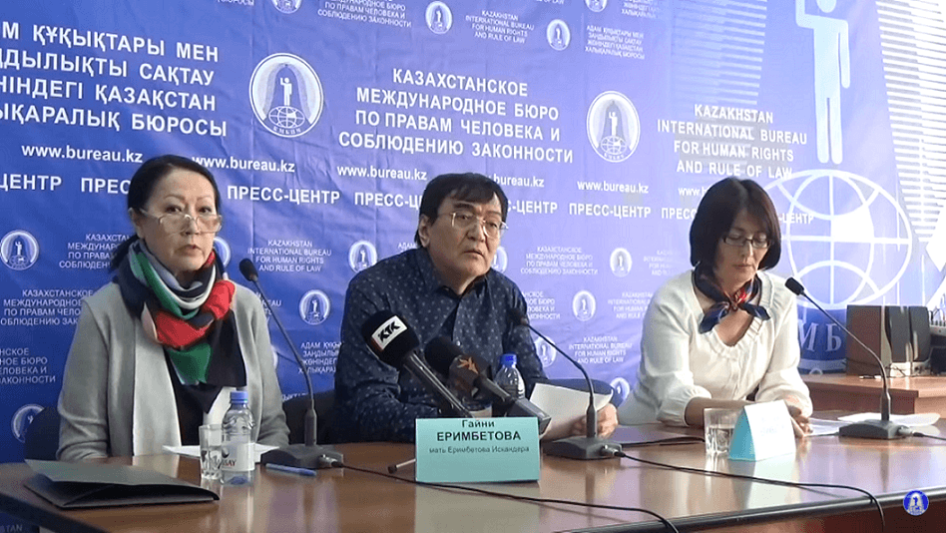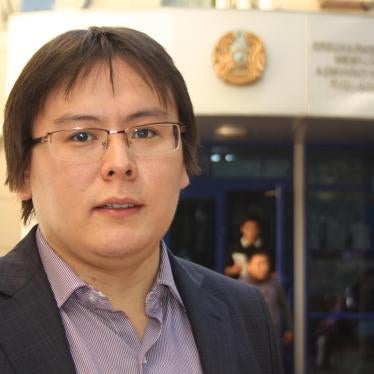(Almaty) – Kazakh authorities should provide immediate medical assistance to a detained businessman who has alleged that he was beaten and ill-treated, the Norwegian Helsinki Committee and Human Rights Watch said today. Authorities should also ensure that their investigation into the allegations of ill-treatment and torture of the businessman, Iskander Erimbetov, is swift, impartial, and thorough, and capable of bringing those responsible for abuse to account.
“The disturbing accounts of Mr. Erimbetov’s case cast doubt on Astana’s commitment to tackle torture and other ill-treatment,” said Bjørn Engesland, secretary-general of the Norwegian Helsinki Committee. “Astana should immediately protect Erimbetov from further abuse and provide him with all necessary medical attention.”
Erimbetov, 46, was arrested on November 13, 2017, as a suspect in a money-laundering investigation tied to an exiled former banker and government critic, Mukhtar Ablyazov. An Almaty court has authorized Erimbetov’s detention until at least March 13, when it will review whether it should be extended.
At news conferences on December 7 and 21, and January 10, 2018, Erimbetov’s parents expressed alarm about the conditions in which Erimbetov is being held and alleged that he was being ill-treated. His mother, Gaini Erimbetova, who is also Erimbetov’s lay public defender, filed a complaint with the prosecutor’s office on January 11, alleging her son had been beaten and injured in custody.
On January 12, Kazakhstan’s Anti-Torture Coalition, a body consisting of 40 human rights groups and independent experts, issued an urgent statement calling on Kazakh authorities to investigate Erimbetov’s claims of ill-treatment and torture.
On January 22, the Almaty City Prosecutor’s Office opened a criminal investigation into the allegations.
Erimbetova told the Norwegian Helsinki Committee that when she met with her son on January 11, his face was bruised and swollen, and that he had a wound on his forehead, with coagulated blood. She said she also saw bruises on her son’s arms and legs and that he appeared to be in “considerable pain, continuously held one hand to his side and complained about headaches and dizziness.”
Erimbetov’s lawyer, Zhanara Balgabaeva, confirmed to Human Rights Watch that Erimbetov had bruises on his face, appeared to have suffered a concussion, and was holding his ribs, complaining of pain. Balgabaeva told Human Rights Watch that she feared for Erimbetov’s safety.
In a statement issued on February 2, independent human rights defenders Yevgeniy Zhovtis, head of the Kazakhstan International Bureau for Human Rights and Rule of Law, and Zhemis Turmagambetova, head of the Charter for Human Rights, who visited Erimbetov in detention at the invitation of the Kazakh government, said they found him to be in “in a state of extreme dejectedness, scared.”
The government initiated the monitoring visit after officials received an urgent communication from the United Nations special rapporteur on torture, Nils Melzner, about the alleged abuse of Erimbetov, according to the defenders’ statement. The defenders expressed “grave concern about the situation in which Mr. Erimbetov finds himself” and said that Erimbetov “essentially confirmed the information contained in the special rapporteur’s inquiry.”
The monitoring team told the authorities that given Mr. Erimbetov’s state of health, “he [should] be provided with emergency medical assistance, including, possibly, placing him in a medical ward and an examination by a medical professional.”
Balgabaeva told Human Rights Watch on February 15 that Erimbetov had received intravenous drips and medication for four days, but had not been transferred to a medical unit, or undergone a full medical examination. The Kazakh authorities should swiftly ensure that Erimbetov receives a full medical examination by an independent doctor and any treatment medically recommended, Human Rights Watch and the Norwegian Helsinki Committee said.
Over the past two months, Erimbetova has repeatedly reported to the media and on her Facebook page that Erimbetov has been ill-treated in detention and that officials have pressured Erimbetov to confess. Erimbetova described to the Norwegian Helsinki Committee efforts by the authorities to force Erimbetov to incriminate himself. When he refused, she said, officials placed him in a cell with four other detainees who beat Erimbetov, including with a wooden stick wrapped in a wet towel, and threatened to rape him with a broomstick. At one point the cellmates apparently attempted to force Erimbetov’s head into a bucket of excrement, and on one occasion they choked him with a cord.
Balgabaeva said that during questioning on January 13, Erimbetov said he did not feel well and that detention officials called an ambulance. The medics who examined Erimbetov concluded he had suffered an injury to his ribs, his lawyer said.
On January 24, two days after the police opened the investigation into Erimbetova’s claims, the agency leading the investigation, the National Anti-Corruption Agency, issued a statement denying that Erimbetov had been “subject to unlawful interrogation methods and torture.” The agency cited the conclusions of the National Ombudsman’s office, which had visited Erimbetov in detention on January 13, and reported that “Erimbetov did not state any complaints and claims related to ill-treatment or other pressure on him” and “a visual examination by [the Ombudsman] did not confirm the presence of bodily injuries mentioned in the abovementioned petition.”
A thorough and impartial investigation is essential to establish the facts and to ensure accountability for any abuses Erimbetov suffered in detention, the Norwegian Helsinki Committee and Human Rights Watch said.
The prohibition of torture is one of the most fundamental in international law. Kazakhstan is party to the Convention against Torture, which defines torture as intentionally inflicting severe pain or suffering for a prohibited purpose, such as to obtain a confession. International law requires investigation and prosecution of those who carried out the abuse, as well as those who ordered it.
“Opening an investigation into Erimbetov’s allegations of torture is an important step, but those responsible for abusing him need to be held accountable for justice to be served,” said Hugh Williamson, Europe and Central Asia director at Human Rights Watch “More immediately, authorities should see to Erimbetov’s health and ensure that he receives proper medical attention.”









